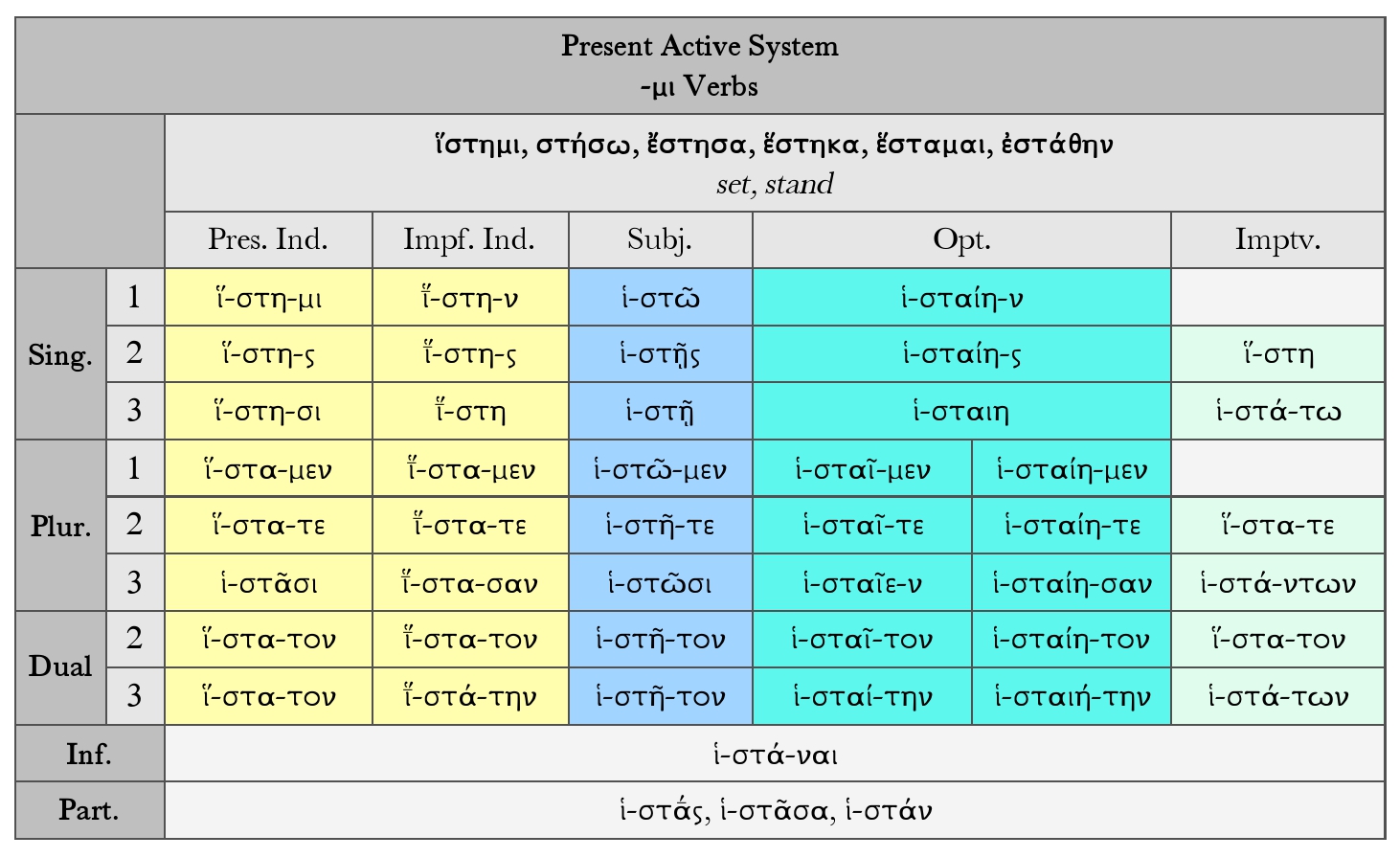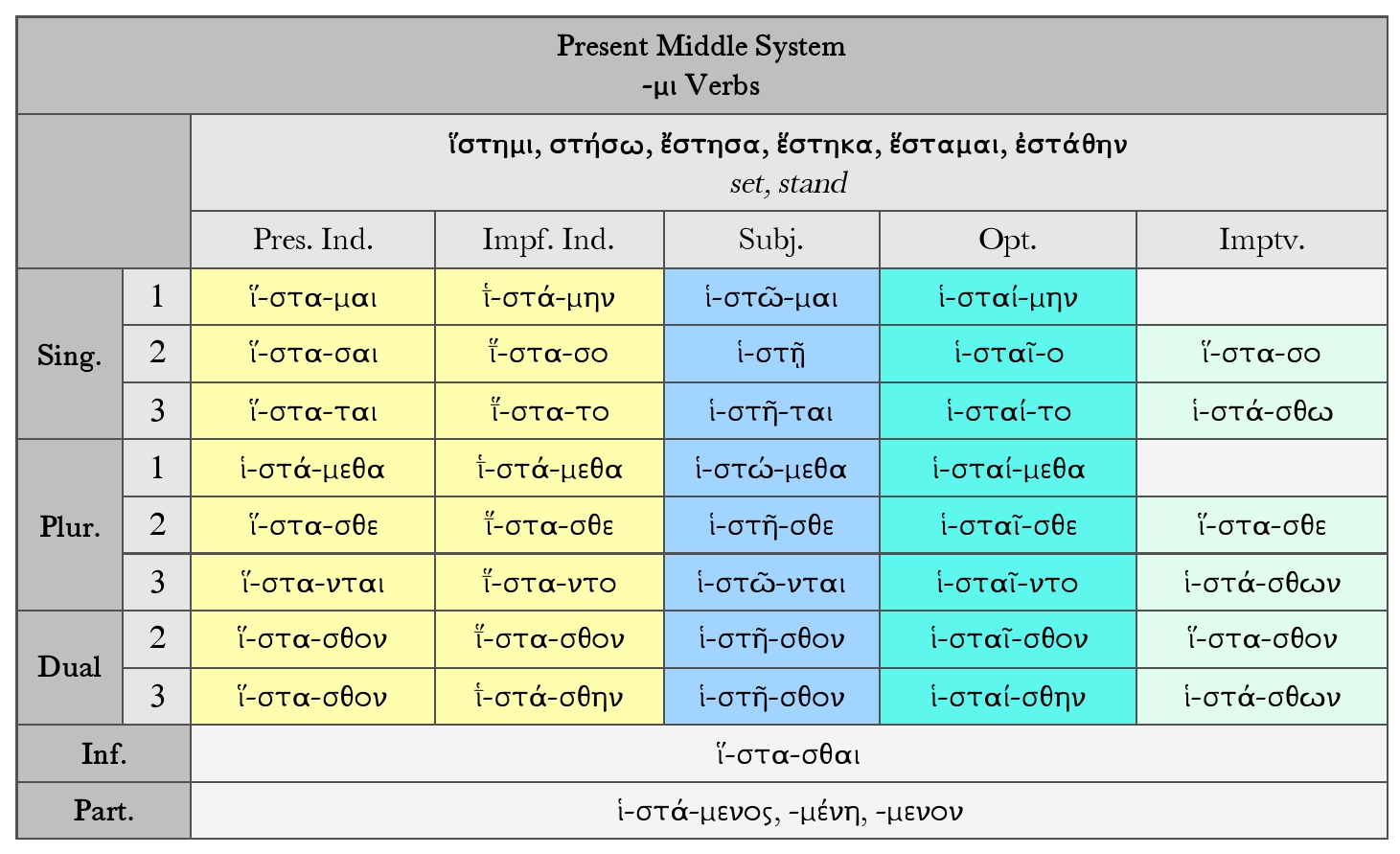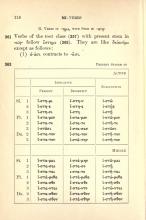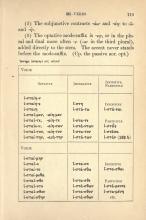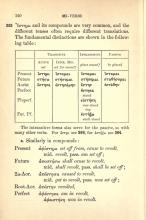361. Verbs of the root class (§ 357) with present stem in -α:η- follow ἵστημι (§ 362, below). They are like δείκνῡμι except as follows.
1. ά-ᾱσι contracts to -ᾶσ
2. The subjunctive contracts -άω- and -άη- to -ῶ- and -ῆ-
3. The optative mode suffix is -ιη-, or in the plural and dual more often -ι- (-ιε- in the 3rd plural), added directly to the stem. The accent never stands before the mode-suffix. (Cp. the passive aorist optative)
362. Present Active and Middle Systems: ἵστημι
363. Ἵστημι and its compounds are very common, and the different tenses often require different translations. The fundamental distinctions are shown in the following table.
| Transitive | Intransitive | Passive | ||
| Active | Indir. Middle | |||
| set | set for oneself | place oneself | be placed | |
| Present | ἵστημι | ἵσταμαι | ἵσταμαι | ἵσταμαι |
| Future | στήσω | στήσομαι | στήσομαι | σταθήσομαι |
| Aorist | ἔστησα | ἐστησάμην | ἔστην | ἐστάθην |
| Perfect | ἔστηκα stand |
|||
| Pluperf. | εἱστήκη was standing |
|||
| Fut. Perf. | ἑστήξω shall stand |
|||
The intransitive forms also serve for the passive, as with many other verbs. For ἔστην see § 366, for ἑστήξω see § 364 (below).
a. Similarly in compounds:
| Verb | Meaning... | |||
| Active | Middle | Passive | ||
| Pres. | ἀφίστημι | set off from cause to revolt |
revolt | am set off |
| Fut. | ἀποστήσω | shall cause to revolt | shall revοlt | shall be set οff |
| Σα-Aor. | ἀπέστησα | caused to revolt | gοt to revolt | was set οff |
| Root-Aor. | ἀπέστην | revolted | ||
| Perfect | ἀφέστηκα | am in revolt | ||
| Pluperf. | ἀφειστήκη | was in revolt | ||
Likewise καθίστημι (set down, settle), καταστήσω (shall settle, trans.), κατέστησα (settled, trans.), κατέστην (became settled), καθέστηκα (am settled), καθειστήκη (was settled).
364. A future perfect active ἑστήξω (shall stand) is formed by adding the future suffix and endings to ἑστηκ- as a perfect stem. In like manner θνῄσκω (die) forms τεθνήξω (shall be dead) from τέθνηκα.
365. The following verbs (which see in the Verb list) are like ἵστημι in the present system.
ὀνίνημι (benefit, mid. be advantaged)
πίμπλημι (fill)
πίμπρημι (set on fire; more frequent in the compound ἐμπίπρημι)
ἄγαμαι (admire)
δύναμαι (can)
ἐπίσταμαι (knοw, understand)
ἐδύνα(σ)ο regularly becomes ἐδύνω.
a. The deponents in this list have recessive accent in the subjunctive and optative, herein differing from ἵστημι.
| Subjv. | δύνωμαι | δύνῃ | δύνηται, etc. |
| Opt. | δύναιο | ἐπίσταιτο | ἄγαιντο |
Likewise in the root-aorist (§ 366) ὠνήμην from ὀνίνημι.
ὄναιο, ὄναιτο, ὄναιντο
and from ἐπριάμη (pres. ὠνέομαι): πρίωμαι, etc.

